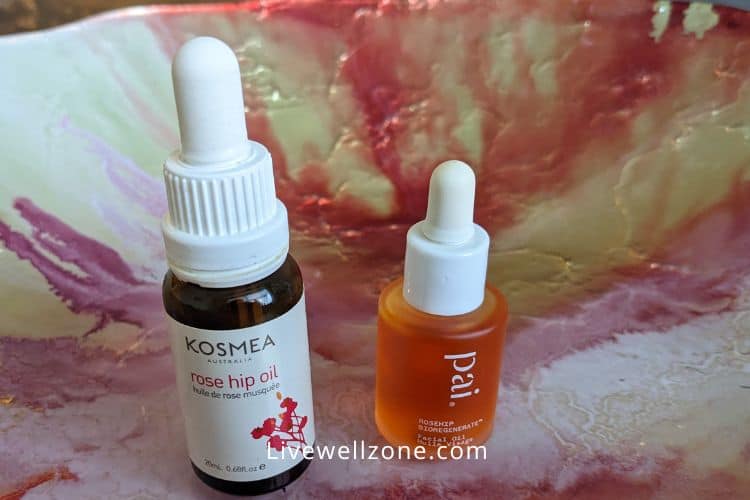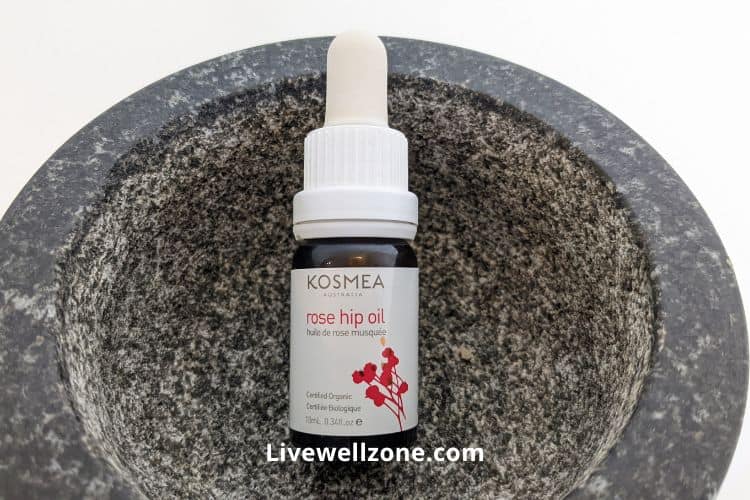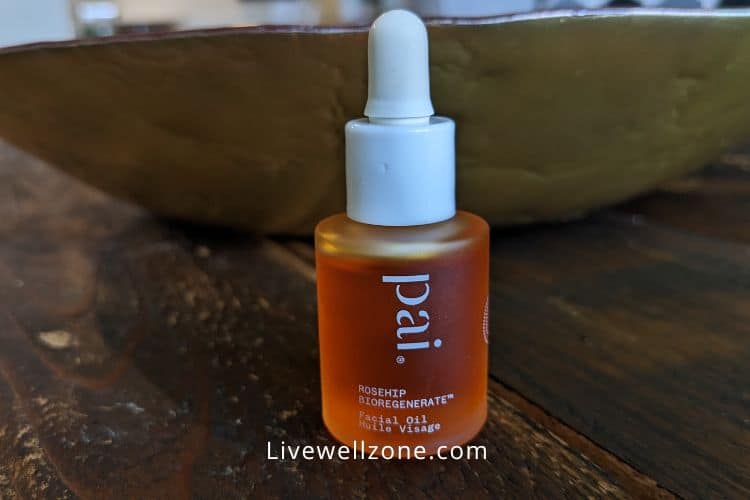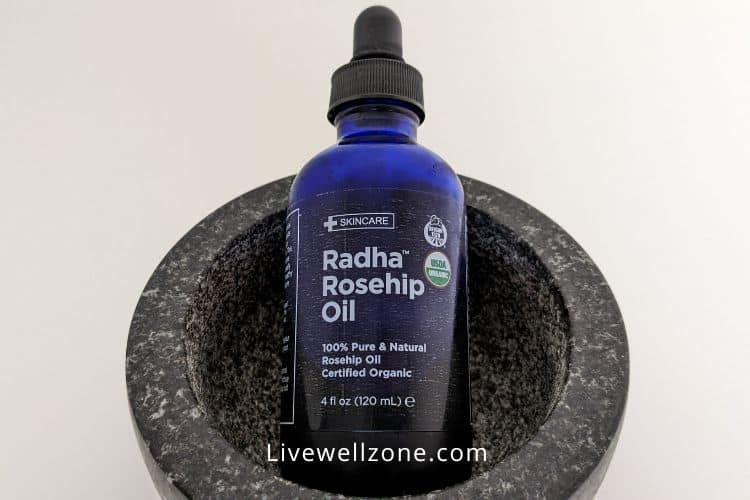
Resolving hyperpigmentation can be a very slow process, especially if you don’t want to rely on harsh actives. However, rosehip oil is one remedy that is packed with constituents that are ideal for addressing skin discoloration (in a more gentle and natural way).
So, in this article we’re going look at why you’d want to use rosehip oil for hyperpigmentation, plus how to get the best results from it. Along the way, I’ll also share my personal experience using rosehip oil for discoloration.
Note: this post contains some affiliate links and I earn a commission (at no additional cost to you) if you use them to make a purchase.
BENEFITS OF ROSEHIP OIL FOR HYPERPIGMENTATION (INCLUDING POST-INFLAMMATORY)
1. Rich in carotenoids (pro vitamin A)
Rosehip oil is quite rich in beta carotene, a carotenoid that the body converts to retinol (1, 2).
Since retinol supports cell turnover, regular use of rosehip oil can help you improve the appearance of dark spots and discoloration.
NOTE: in order to get the most beta carotene, make sure the oil is extracted from the seed and outer flesh of the rosehip. The outer flesh can have up to 5 times more beta carotene than the seed. If the oil is made from the seed only, you will still get beta carotene, but not as much.
2. May help acne and PIH (post inflammatory hyperpigmentation).
If you have acne-prone skin, rosehip can be beneficial because it:
- Is rich in linoleic acid, a fatty acid that is essential for a healthy skin barrier. Acne-prone skin tends to have a compromised skin barrier and also tends to produce sebum that is low in this fatty acid (source).
- Contains beta carotene, the raw material that the body uses to make retinol (which is a treatment for PIH).
While rosehip oil is not as potent as retinol, it can be a gentler and less irritating remedy for acne and PIH.
3. Natural Source of Soothing Vitamin E and Fatty Acids
Like all carrier oils, rosehip oil contains vitamin E and fatty acids. The former has antioxidant and anti-inflammatory properties, while the latter is mainly anti-inflammatory.
Together, these constituents help to calm inflamed skin. Therefore, it’s no surprise that some people use rosehip oil for conditions like rosacea, eczema, acne and more.
By calming the skin, rosehip may also help to prevent hyperpigmentation from getting worse.
HOW TO USE ROSEHIP OIL FOR DARK SPOTS AND UNEVEN SKIN TONE
- Always apply to clean skin.
- Use up to twice a day (morning and night).
- Apply it after your water-based products (including water-based moisturizer).
- If you choose to skip moisturizer, then make sure your face is damp before applying rosehip oil. NEVER apply it directly to dry skin because your skin can actually feel drier.
- Consider combining it with other ingredients that address hyperpigmentation (such as azelaic acid or vitamin C). Rosehip oil is soothing and calming, making it a good complement to those more potent ingredients. Here’s a guide on what to combine with rosehip oil to help you understand what goes well with rosehip oil.
- If you’re trying to balance out the skin tone of the lips, you can apply a drop of rosehip oil on your lips before you go to bed. Or if you’re in to DIY remedies, then make a lip balm with rosehip oil, shea butter and beeswax, for example.
ROSEHIP OIL FOR HYPERPIGMENTATION: BEFORE AND AFTER
Several months ago I had a nasty fall and hit my forehead. Thankfully my head was fine!
But I ended up with a dark line in the middle of my forehead. It ran from my hairline to my eyebrow and then about an inch below my right eye.
The very next day I started applying a drop of rosehip oil to the line every morning. Here’s how it went:
- By day 3 the smaller line below my eye was gone while the larger one on my forehead started fading.
- By day 7 the larger line was almost completely gone.
- Within two weeks my skin was back to normal.
I wish I had taken pictures to share with you. But nonetheless I just wanted to share my experience with this oil.
My guess is that the oil worked faster because I started using it immediately after the injury happened. Had the injury been older, I probably would have had to use the oil for a longer period of time.
BEST ROSEHIP OILS FOR HYPERPIGMENTATION
1. Kosmea Organic Rosehip Oil

This is my go-to rosehip oil because it is:
- extracted from the rosehip seed and outer flesh. As I mentioned earlier, the outer flesh can have up to 5 times more beta carotene. This means means more raw material for your body to make that all-important retinol!
- CO2 (carbon dioxide) extracted. The temperature for CO2 extraction is lower than the one for cold-pressing. This lower temperature helps to preserve more of the delicate components of the oil.
2. Pai Rosehip BioRegenerate

“Cult favorite” is the term that is often used when it comes to Pai’s rosehip oil.
Not only is it made from the seed, pulp and skin, but it is also CO2-extracted.
In addition there’s some rosemary extract and vitamin E included (although they are likely in small amounts, acting as preservatives).
Get this Rosehip BioRegenerate Oil.
3. Radha Rosehip Oil

When it comes to cold-pressed rosehip oils, this is one of the most popular on Amazon.
It’s organic and has plenty of positive feedback all around the web.
4. The Ordinary Rosehip Oil
For the budget conscious shopper, The Ordinary is usually where it’s at.
This is cold-pressed from the seed and like all products from The Ordinary, it has lots of raving fans.
Get The Ordinary’s Rosehip Oil.
CONCLUSION
Rosehip oil is a very versatile oil that nourishes all skin types.
Yet, this oil really shines when it comes to its ability to tackle stubborn skin conditions like hyperpigmentation.
If you’re a fan of natural solutions, I hope you give this oil a try!
You Might Also Like:
How to Use Carrot Seed Oil for Hyperpigmentation
How To Add Rosehip Oil To Your Skin Care Routine: In-Depth Guide
The Difference Between Rosehip Oil and Rosehip Seed Oil: Benefits, Which To Use and How to Use

